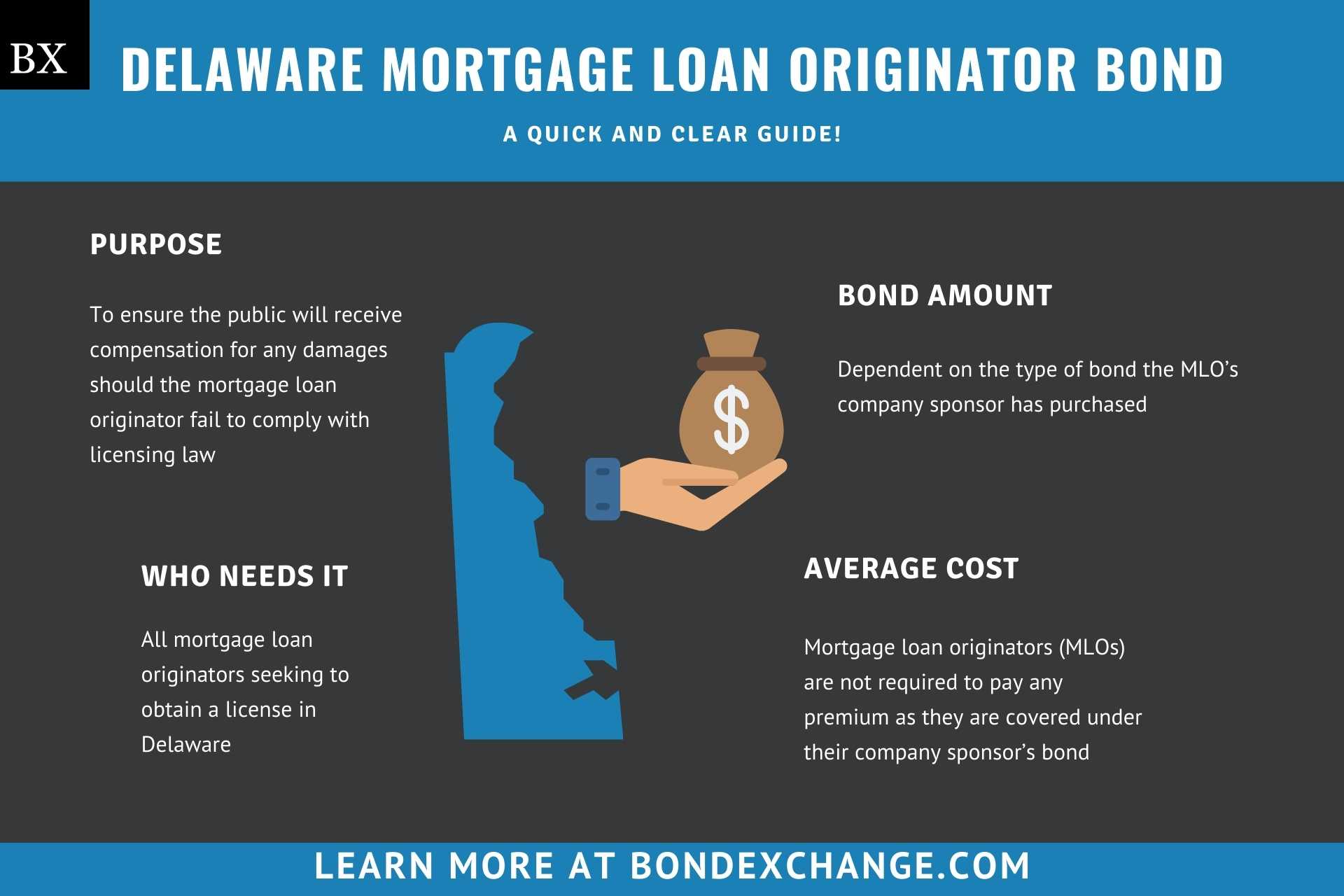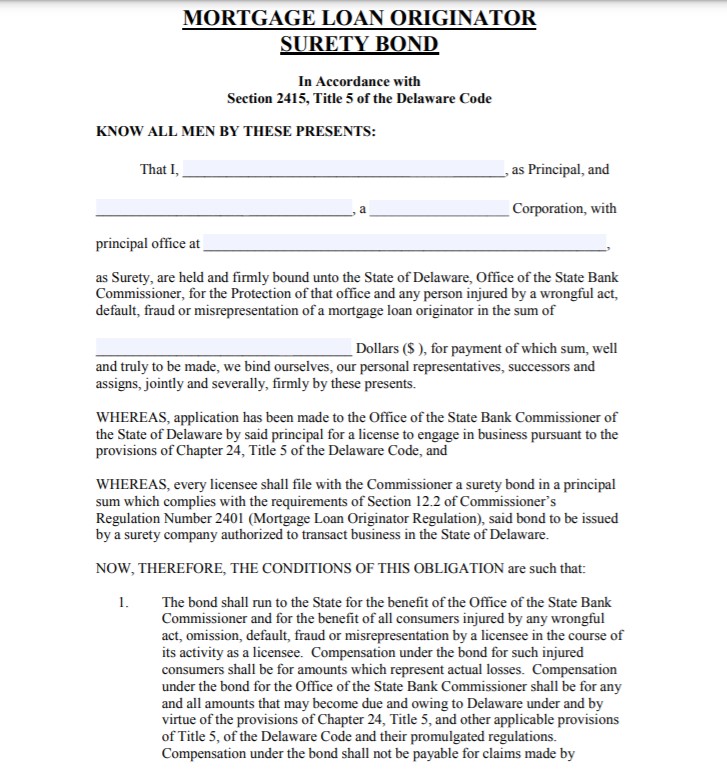Delaware Mortgage Loan Originator Bond: A Comprehensive Guide
April 19, 2021

This guide provides information for insurance agents to help mortgage loan originators obtain Delaware Mortgage Loan Originator Bonds
At a Glance:
- Average Cost: Mortgage loan originators (MLOs) are not required to pay any premium as they are covered under their company sponsor’s bond
- Bond Amount: Dependent on the type of bond the MLO’s company sponsor has purchased (more on this later)
- Who Needs it: All mortgage loan originators seeking to obtain a license in Delaware
- Purpose:To ensure the public will receive compensation for any damages should the mortgage loan originator fail to comply with licensing law
- Who Regulates Mortgage Loan Originators in Delaware: The Delaware Office of the State Bank Commissioner
Background
Delaware Statute 2404 requires all mortgage loan originators operating in the state to obtain a license with the Office of the State Bank Commissioner. The Delaware legislature enacted the licensing laws and regulations to ensure that mortgage loan originators engage in ethical business practices. In order to provide financial security for the enforcement of the licensing law, mortgage loan originators must be covered under their employer’s surety bond to be eligible for licensure.
What is the Purpose of the Delaware Mortgage Loan Originator Bond?
Delaware requires mortgage loan originators to be listed under their employer’s surety bond coverage as part of the application process to obtain a business license. The bond ensures that the public will receive compensation for financial harm if the mortgage loan originator fails to comply with the licensing regulations. In short, the bond is a type of insurance that protects the public if the mortgage loan originator breaks licensing laws.

How Can an Insurance Agent Obtain a Delaware Mortgage Loan Originator Surety Bond?
BondExchange makes obtaining a Delaware Mortgage Loan Originator Bond easy. Simply login to your account and use our keyword search to find the “mortgage” bond in our database. Don’t have a login? Enroll now and let us help you satisfy your customers’ needs. Our friendly underwriting staff is available by phone (800) 438-1162, email or chat from 7:30 AM to 7:00 PM EST to assist you.
At BondExchange, our 40 years of experience, leading technology, and access to markets ensures that we have the knowledge and resources to provide your clients with fast and friendly service whether obtaining quotes or issuing bonds.
What is the Bond Amount?
Mortgage loan originators are not required to purchase a surety bond, but rather must be covered under their employer’s bond. MLOs will either work for a licensed mortgage broker or lender. The limit on the Delaware Mortgage Broker bond is $25,000, and the limit on the Delaware Mortgage Lender bond is determined on a case by case basis and ranges from $50,000 to $200,000.
Do Mortgage Loan Originators Pay for Their Bond?
As mentioned above, MLOs are not required to purchase a bond if their employer lists them under their bond coverage. MLOs are not subject to underwriting factors such as credit checks or years of business experience requirements. The MLO’s employer will be liable for all premium payments, not the MLO themself.
How Does Delaware Define “Mortgage Loan Originator?”
Delaware Statute 2403 defines a mortgage loan originator as any individual who performs one or both of the following functions:
- Takes a residential mortgage loan application; or
- Offers or negotiates terms of a residential mortgage loan
How do Mortgage Loan Originators Apply for a License in Delaware?
Mortgage loan originators in Delaware must navigate several steps to secure their license. Below are the general guidelines, but license applicants should refer to the NMLS’s application guidelines for details on the process.
License Period – The Delaware Mortgage Loan Originator License expires on December 31 of each year and must be renewed before the expiration date
Step 1 – Obtain a Company Sponsorship
MLOs must have their employer’s sponsor their license application and extend their surety bond coverage to cover the MLO license applicant. Employer’s can submit a sponsorship request through the Nationwide Multistate Licensing System (NMLS) when the MLO submits their license application.
Step 2 – Complete the Pre-Licensure Education
All license applicants must complete a minimum of 20 hours of pre-licensure education conducted by an approved course provider (must have an NMLS account to access this link)
Step 3 – Pass the Exam
After completing their pre-licensure education, MLO’s must satisfy one of the following testing requirements:
-
- Passing results on both the National and Delaware State components of the SAFE Test, or
- Passing results on both the National and Stand-alone UST components of the SAFE Test, or
- Passing results on the National Test Component with Uniform State Content
Step 4 – Request a NMLS Account
The Delaware Mortgage Loan Originator License application is submitted electronically through the Nationwide Multistate Licensing System (NMLS). To submit a license application, applicants must first request to obtain an NMLS account.
Step 5 – Complete the Application
All Delaware Mortgage Loan Originator License applications can be completed online through the NMLS. Applicants must complete the entire application, and submit documentation verifying their employment history.
License applicants must pay the following fees when submitting their application:
-
- $30 NMLS processing fee
- $250 license fee
- $250 application fee
- $15 credit report fee
- $36.25 background check fee
How Do Delaware Mortgage Loan Originators Renew Their License?
Mortgage Loan Originators can renew their license online through the NMLS. License holders need to simply login to their account to access their renewal application. The Delaware Mortgage Loan Originator License expires on December 31 of each year and must be renewed before the expiration date.
What Are the Insurance Requirements for the Delaware Mortgage Loan Originator License?
The State of Delaware does not require mortgage loan originators to obtain any form of liability insurance as a prerequisite to obtaining a business license. MLOs must be covered under their employers surety bond.
Do Delaware Mortgage Loan Originators Need to File a Bond?
Mortgage loan originators aren’t required to purchase a bond, however they will need to file documentation verifying they are covered under their employer’s bond. Mortgage loan originators should submit their coverage verification document electronically through the NMLS.
What Can Delaware Mortgage Loan Originators Do to Avoid Claims Against Their Employer’s Bond?
In order to avoid claims made against their employer’s bond, mortgage loan originators in Delaware must ensure not to engage in any acts of fraud or misrepresentation when servicing customers.
What Other Insurance Products Can Agents Offer Mortgage Loan Originators in Delaware?
Delaware does not require mortgage loan originators to purchase any form of liability insurance as a prerequisite to obtaining a license. However, most reputable MLOs will seek to obtain this insurance anyway. Bonds are our only business at BondExchange, so we do not issue liability insurance, but our agents often utilize brokers for this specific line of business. A list of brokers in this space can be found here.
How Can Insurance Agents Prospect for Delaware Mortgage Loan Originator Customers?
The NMLS conveniently provides a public database to search for active mortgage loan originators in Delaware. The database can be accessed here. Contact BondExchange for additional marketing resources. Agents can also leverage our print-mail relationships for discounted mailing services.

